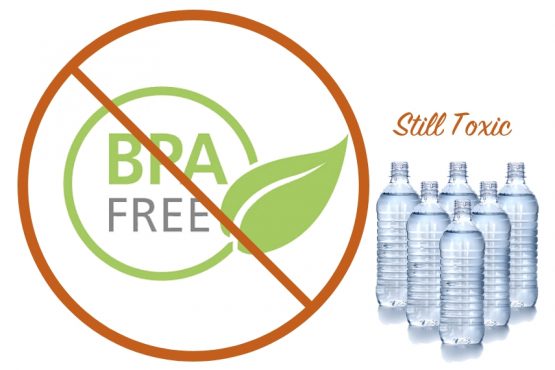An Alphabet of Bisphenols – BPA-Free, but BPS, BPF, BPZ, and more still included…
The Myth of BPA-Free Plastic
Many of us feel reassured when we grab a plastic bottle to drink from if it has a sticker that says “BPA free”. However, mounting evidence is showing that the replacements for BPA might be just as harmful.
My husband and I recently got ourselves tested for different toxins in our bodies through Silent Spring Institute. We were both low on many of the toxins tested for but the one place where we differed was in BPS.

Suzanne’s BPS Results from Silent Spring Institute

Matt’s results were higher than the US median on this one chemical.
Comparing US Median & Study Median Results
I found it interesting that of all of the study results I saw, this was the one chemical where the average of the people participating in the study was higher than the US median as well. On most chemicals, the average of the participants was lower than the US average, which is what you would expect from people knowledgeable enough about environmental toxins to take this test in the first place. I find it extremely interesting that on BPS, the participants were higher. I believe it might be because, like my husband, many participants look for the BPA-free label on plastics and believe they are okay with the plastics they are choosing. It is possible that BPS is being used as the replacement in water bottles labeled as BPA-free.
Bisphenols in Common Items
Bisphenols A, S, and F (BPA, BPS, and BPF), as well as additional bisphenols, are used primarily to make plastics and epoxy resins and coatings. BPA is found in some polycarbonate plastics, linings for aluminum food and beverage cans, and thermal receipt paper. BPS, sometimes used as a substitute to BPA, is commonly found in thermal receipt paper and is an ingredient in polycarbonate alternatives such as polyethersulfones. BPS and BPF have also been detected in canned food and beverages.
Bisphenol exposure has been associated with reproductive disorders, cancer, neurodevelopmental problems and asthma.
New Legislation Coming to New York
Legislation might soon address this issue. The state of New York recently introduced a bill (NY S07944) that would expand the “Bisphenol A-free Children and Babies Act” of 2010 to cover several common BPA substitutes. Current law prohibits the sale of any children’s products containing BPA, but does not prohibit substitution of related chemicals that have similar structure and can cause similar health harm. The new legislation, scheduled to go into effect on December 31, 2019, was initiated after a recent study showed the estrogenic effects of six different bisphenols. The state amendment will expand the existing ban to now include: bisphenol AF, Z, S, F, AP, and B.
This bill was designed as a response to multiple studies which conclude many BPA substitution chemicals are as, if not more, harmful than the chemicals they’re designed to replace. A study published in September 2017 found that 6 of these BPA substitutes mimic estrogen in breast cancer cells. Three of the six even more so than BPA itself. Learn more about the study in our article, BPA Substitute Chemicals May be More Harmful than BPA Itself
New York has been a leader in laws to remove toxic chemicals from products for years. The state has already banned mercury and polybrominated diphenyl ethers (compounds frequently used as flame retardants) in products. New York was also the first state in the US to ban the carcinogenic flame retardant TCEP and one of the first to ban BPA in baby bottles and sippy cups.
Update on NY S07944: Unfortunately, this bill died in committee. However, even though it is not moving forward, it is an important step that signals the growing awareness of the harms of BPA alternative chemicals on the market.
Source: http://greensciencepolicy.org/
Related Articles
Why BPA-Free Products Aren’t Any Better
There’s BPA in that Receipt Paper
BPA: Not Just in Baby Bottles
BPA Substitute Chemicals May be More Harmful than BPA Itself


